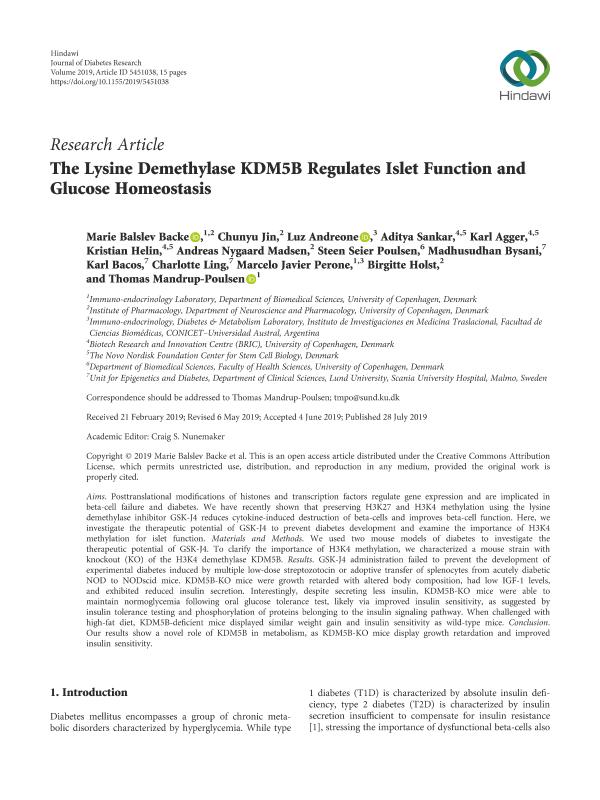Mostrar el registro sencillo del ítem
dc.contributor.author
Backe, Marie Balslev
dc.contributor.author
Jin, Chunyu
dc.contributor.author
Andreone, Luz

dc.contributor.author
Sankar, Aditya
dc.contributor.author
Agger, Karl
dc.contributor.author
Helin, Kristian
dc.contributor.author
Madsen, Andreas N.
dc.contributor.author
Poulsen, Steen S.
dc.contributor.author
Bysani, Madhusudhan
dc.contributor.author
Bacos, Karl
dc.contributor.author
Ling, Charlotte
dc.contributor.author
Perone, Marcelo Javier

dc.contributor.author
Holst, Birgitte
dc.contributor.author
Mandrup Poulsen, Thomas
dc.date.available
2022-07-19T16:30:52Z
dc.date.issued
2019-07
dc.identifier.citation
Backe, Marie Balslev; Jin, Chunyu; Andreone, Luz; Sankar, Aditya; Agger, Karl; et al.; The Lysine Demethylase KDM5B Regulates Islet Function and Glucose Homeostasis; Hindawi Publishing Corporation; Journal of Diabetes Research; 2019; 5451038; 7-2019; 1-16
dc.identifier.issn
2314-6745
dc.identifier.uri
http://hdl.handle.net/11336/162535
dc.description.abstract
Aims. Posttranslational modifications of histones and transcription factors regulate gene expression and are implicated in beta-cell failure and diabetes. We have recently shown that preserving H3K27 and H3K4 methylation using the lysine demethylase inhibitor GSK-J4 reduces cytokine-induced destruction of beta-cells and improves beta-cell function. Here, we investigate the therapeutic potential of GSK-J4 to prevent diabetes development and examine the importance of H3K4 methylation for islet function. Materials and Methods. We used two mouse models of diabetes to investigate the therapeutic potential of GSK-J4. To clarify the importance of H3K4 methylation, we characterized a mouse strain with knockout (KO) of the H3K4 demethylase KDM5B. Results. GSK-J4 administration failed to prevent the development of experimental diabetes induced by multiple low-dose streptozotocin or adoptive transfer of splenocytes from acutely diabetic NOD to NODscid mice. KDM5B-KO mice were growth retarded with altered body composition, had low IGF-1 levels, and exhibited reduced insulin secretion. Interestingly, despite secreting less insulin, KDM5B-KO mice were able to maintain normoglycemia following oral glucose tolerance test, likely via improved insulin sensitivity, as suggested by insulin tolerance testing and phosphorylation of proteins belonging to the insulin signaling pathway. When challenged with high-fat diet, KDM5B-deficient mice displayed similar weight gain and insulin sensitivity as wild-type mice. Conclusion. Our results show a novel role of KDM5B in metabolism, as KDM5B-KO mice display growth retardation and improved insulin sensitivity.
dc.format
application/pdf
dc.language.iso
eng
dc.publisher
Hindawi Publishing Corporation

dc.rights
info:eu-repo/semantics/openAccess
dc.rights.uri
https://creativecommons.org/licenses/by-nc-sa/2.5/ar/
dc.subject
Glucose metabolism
dc.subject
Diabetes
dc.subject
Beta-cells
dc.subject
Lysine demethylase
dc.subject.classification
Fisiología

dc.subject.classification
Medicina Básica

dc.subject.classification
CIENCIAS MÉDICAS Y DE LA SALUD

dc.title
The Lysine Demethylase KDM5B Regulates Islet Function and Glucose Homeostasis
dc.type
info:eu-repo/semantics/article
dc.type
info:ar-repo/semantics/artículo
dc.type
info:eu-repo/semantics/publishedVersion
dc.date.updated
2020-11-20T19:59:20Z
dc.identifier.eissn
2314-6753
dc.journal.volume
2019
dc.journal.number
5451038
dc.journal.pagination
1-16
dc.journal.pais
Egipto

dc.description.fil
Fil: Backe, Marie Balslev. Universidad de Copenhagen; Dinamarca
dc.description.fil
Fil: Jin, Chunyu. Universidad de Copenhagen; Dinamarca
dc.description.fil
Fil: Andreone, Luz. Universidad Austral. Facultad de Ciencias Biomédicas. Instituto de Investigaciones en Medicina Traslacional. Consejo Nacional de Investigaciones Científicas y Técnicas. Oficina de Coordinación Administrativa Parque Centenario. Instituto de Investigaciones en Medicina Traslacional; Argentina
dc.description.fil
Fil: Sankar, Aditya. Universidad de Copenhagen; Dinamarca. The Novo Nordisk Foundation Center for Stem Cell Biology; Dinamarca
dc.description.fil
Fil: Agger, Karl. Universidad de Copenhagen; Dinamarca. The Novo Nordisk Foundation Center for Stem Cell Biology; Dinamarca
dc.description.fil
Fil: Helin, Kristian. Universidad de Copenhagen; Dinamarca. The Novo Nordisk Foundation Center for Stem Cell Biology; Dinamarca
dc.description.fil
Fil: Madsen, Andreas N.. Universidad de Copenhagen; Dinamarca
dc.description.fil
Fil: Poulsen, Steen S.. Universidad de Copenhagen; Dinamarca
dc.description.fil
Fil: Bysani, Madhusudhan. Lund University; Suecia
dc.description.fil
Fil: Bacos, Karl. Lund University; Suecia
dc.description.fil
Fil: Ling, Charlotte. Lund University; Suecia
dc.description.fil
Fil: Perone, Marcelo Javier. Universidad de Copenhagen; Dinamarca. Universidad Austral. Facultad de Ciencias Biomédicas. Instituto de Investigaciones en Medicina Traslacional. Consejo Nacional de Investigaciones Científicas y Técnicas. Oficina de Coordinación Administrativa Parque Centenario. Instituto de Investigaciones en Medicina Traslacional; Argentina
dc.description.fil
Fil: Holst, Birgitte. Universidad de Copenhagen; Dinamarca
dc.description.fil
Fil: Mandrup Poulsen, Thomas. Universidad de Copenhagen; Dinamarca
dc.journal.title
Journal of Diabetes Research
dc.relation.alternativeid
info:eu-repo/semantics/altIdentifier/doi/http://dx.doi.org/10.1155/2019/5451038
dc.relation.alternativeid
info:eu-repo/semantics/altIdentifier/url/https://www.hindawi.com/journals/jdr/2019/5451038/
Archivos asociados
